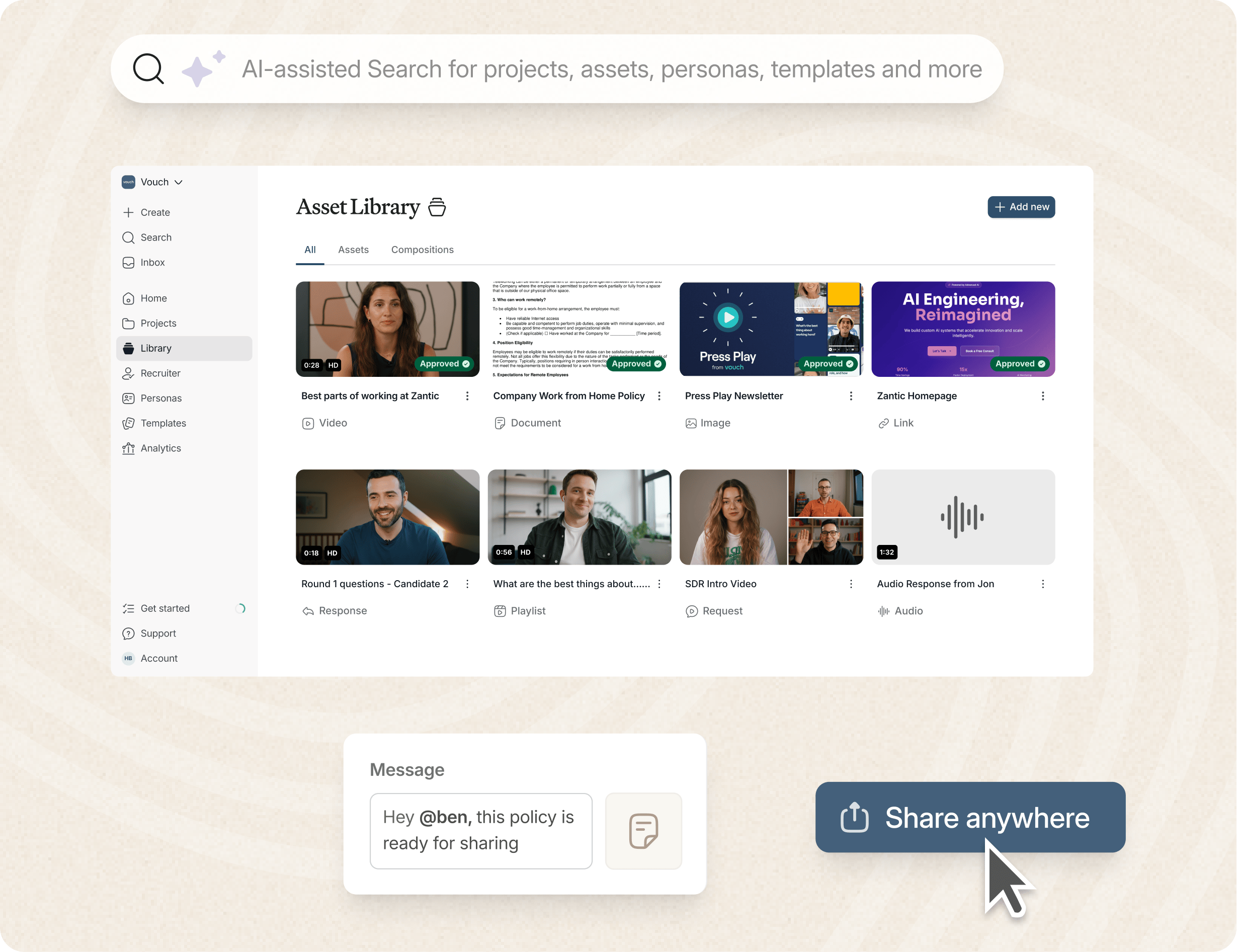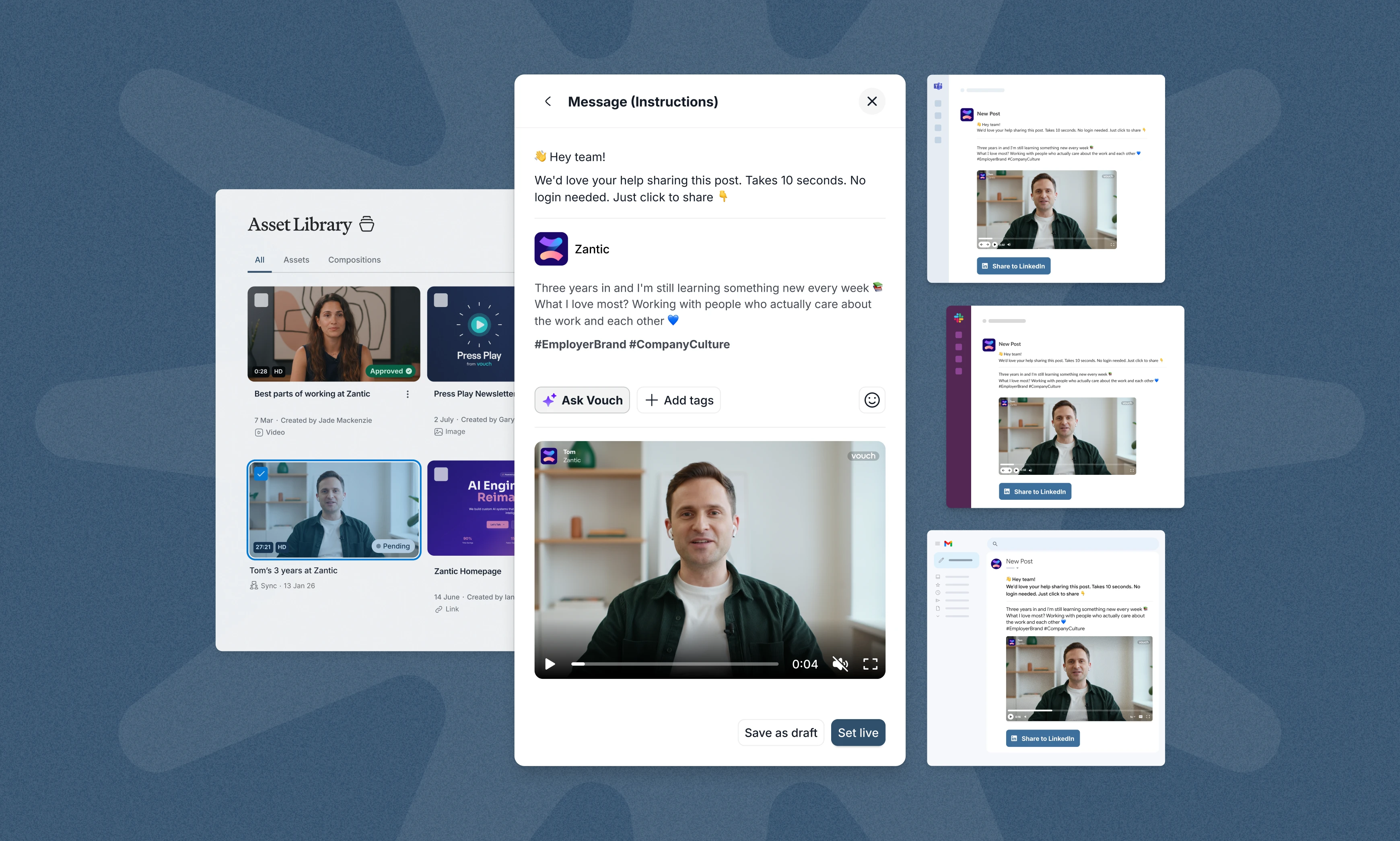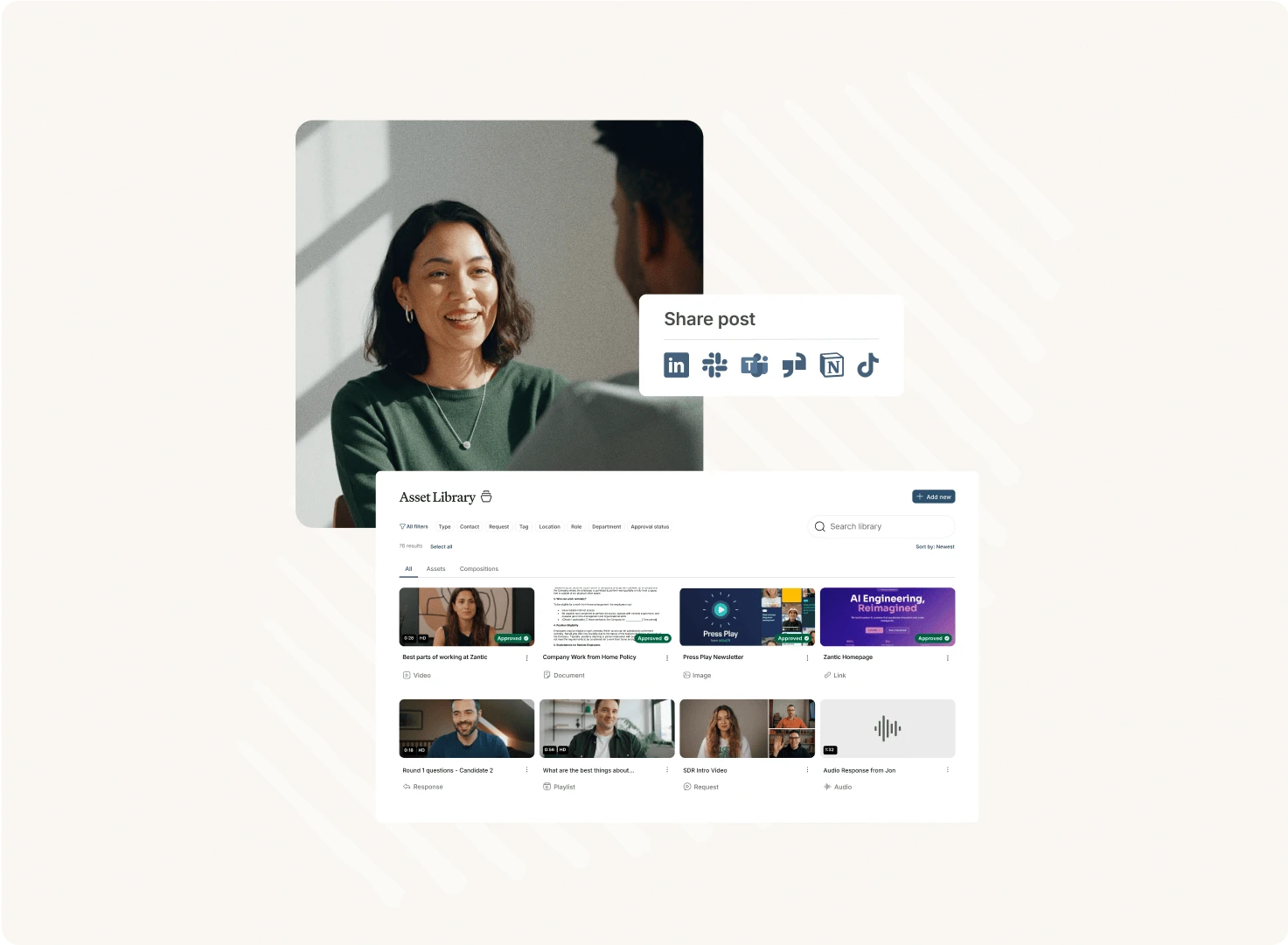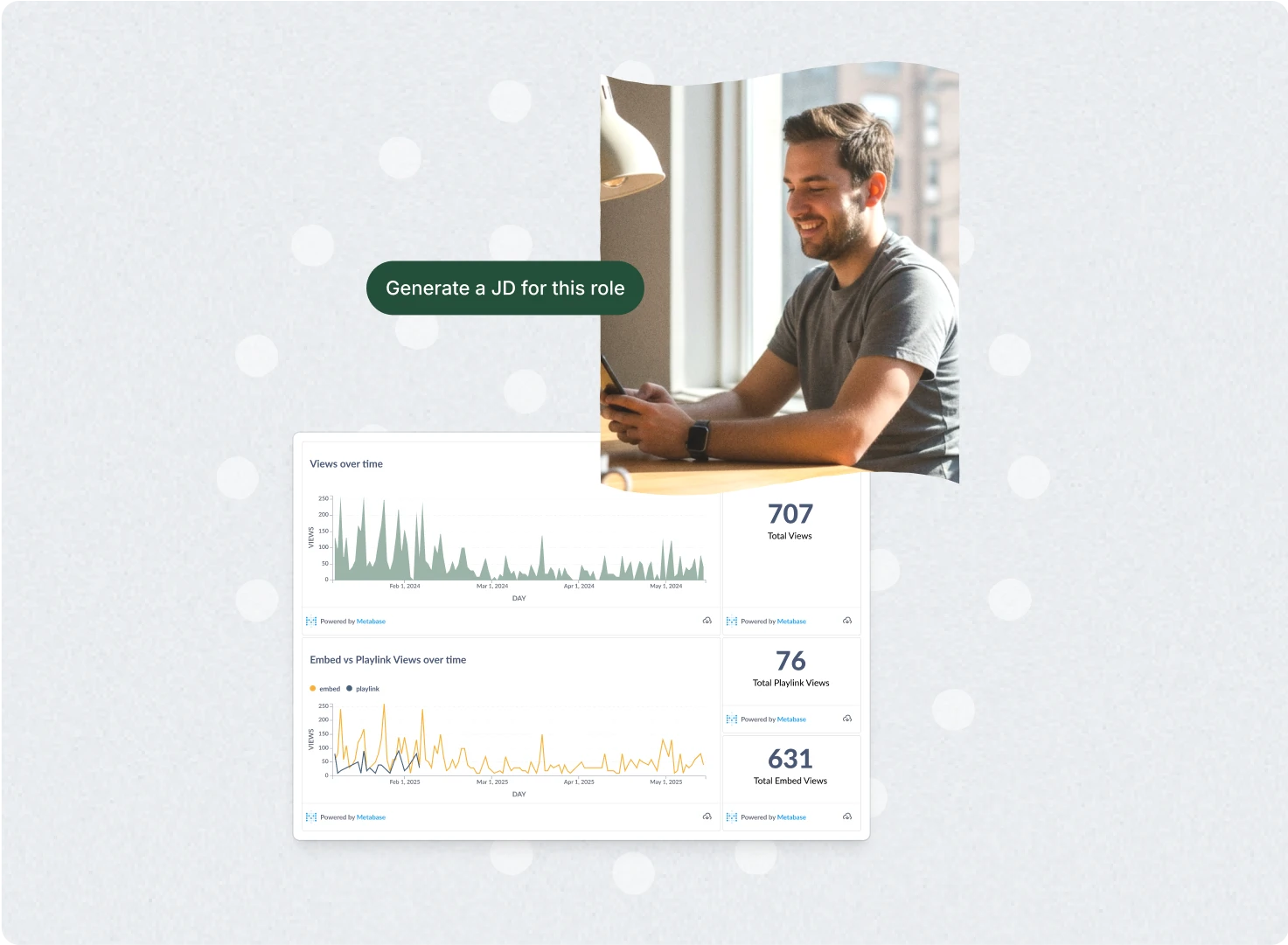Recruiting in 2025 is a highly competitive field, and staying ahead of the market requires innovative strategies.
One strategy that has revolutionized the recruitment process is leveraging social media and media tools like Vouch Video to attract a wider pool of talent and engage with potential candidates in real time. Social media makes recruitment much more effective than ever before.
In this article, we will explore how recruiters can harness the power of social media to achieve success in finding top talent and showcasing your workplace culture. There are numerous benefits to recruiting through social media, so let's dive in!
Key Takeaways:
- Social media has revolutionized the recruitment process for recruiters of all kinds, in-house and agencies.
- Social recruiting is widely adopted by employers globally.
- Recruiters can utilize social media platforms to find and engage with potential candidates effectively.
- Crafting share-worthy job postings and utilizing employee networks are essential strategies for successful recruitment on social media.
- Choosing the right platforms for social media hiring is crucial.
What is Social Recruiting?
Social recruiting involves leveraging social media platforms to source, engage, and hire candidates. It goes beyond traditional methods by utilizing the vast reach and user engagement of platforms like LinkedIn, Twitter, Facebook, and Instagram to connect with potential candidates.
To highlight the potential of social media for recruitment, we only need to look at the statistics:
- SHRM reveals that presently, 84% of companies engage in social media for recruitment purposes.
- According to CareerArc, 86% of job seekers utilize social media in their quest for employment.
- A 2019 Jobvite survey reported that 35% of respondents reported discovering new job opportunities through social media.
- Express highlights that 71% of hiring decision-makers consider reviewing social media profiles an effective method for screening job applicants.
- Approximately 40 million individuals explore job opportunities on LinkedIn weekly.
- As per Jobvite, 78% of recruiters anticipate an increased reliance on social media for discovering potential candidates.
How To Create Share-Worthy Job Postings?
Creating a job posting that stands out among the noise on social media is crucial. To craft a share-worthy job posting, recruiters should focus on the following:
- Engaging content: Use compelling language and an engaging tone to capture the attention of potential candidates.
- Clear and concise information: Clearly outline the job requirements, qualifications, and responsibilities, making it easy for candidates to understand if they are a good fit.
- Highlight company culture: Showcase your company's culture and values to attract candidates who resonate with your organization's ethos.
- Include visuals: Incorporate eye-catching visuals like images, videos, or infographics to make the job posting visually appealing and shareable.
By implementing these strategies, recruiters can create job postings that are not only attention-grabbing but also highly shareable, increasing their reach and visibility among potential candidates.
The AI-enabled workspace for talent teams.
- Unified workspace for talent teams
- Accelerate hiring with AI tools
- Auto-generate polished hiring and employer brand content
- Easily repurpose assets across all channel

How Do You Choose the Right Platforms for Social Media Hiring?
While LinkedIn is widely recognized as the go-to platform for talent acquisition, with some mind-bending statistics:
On LinkedIn:
- Over 20 million open job listings are posted on LinkedIn Jobs.
- 55 job applications are submitted every second.
- 50 million companies are listed on LinkedIn.
- 2 million small businesses are using LinkedIn to hire employees.
What Other Social Media Platforms Are Great For Recruitment?
Going beyond LinkedIn and harnessing the power of Twitter, Facebook, and Instagram can enhance your recruitment efforts.
By exploring other platforms, you can tap into a wider pool of potential candidates and increase the chances of finding the perfect fit for your organization.
Twitter: Offers a fast-paced and real-time environment where job seekers actively engage in industry discussions and share their professional achievements. Harnessing Twitter's vast user base and utilizing relevant hashtags can help you connect with passive candidates and access a diverse talent pool.
Tips for Harnessing Twitter in Recruitment:
- Utilize relevant hashtags in your job postings to increase visibility.
- Engage with industry influencers and participate in relevant discussions to build your network.
- Share company updates, employee testimonials, and industry news to attract passive candidates.
Facebook: With its extensive user base and advanced targeting options, it presents a unique opportunity for recruiters to reach a large audience. Creating a dedicated company page and leveraging Facebook's job posting features can help you attract candidates who may not be actively searching for jobs elsewhere.
Tips for Harnessing Facebook in Recruitment:
- Create a compelling company page that showcases your employer's brand and company culture.
- Use Facebook's job posting features to reach a wide audience and encourage referrals.
- Utilize targeted advertising to reach specific demographics and geographical locations.
Instagram, known for its visual storytelling capabilities, allows recruiters to showcase their company culture and highlight their employer brand. With the ability to create engaging and visually appealing content, Instagram can serve as an effective recruitment marketing tool, especially when targeting younger talent.
Tips for Harnessing Instagram in Recruitment:
- Showcase behind-the-scenes glimpses of your workplace culture to attract candidates who align with your values.
- Create visually appealing content that highlights employee experiences and career development opportunities.
- Engage with potential candidates through comments and direct messages to foster relationships.
By strategically utilizing Twitter, Facebook, and Instagram in your recruitment efforts, you can expand your reach, build your employer brand, and connect with a diverse pool of candidates.
How Do You Measure the Impact and Effectiveness of Social Recruiting?
When it comes to social recruiting, it's crucial for recruiters to measure the impact and effectiveness of their efforts. By analyzing the results of their social media recruitment campaigns, recruiters can gain valuable insights into the success of their strategies and make data-driven decisions to optimize their future efforts.
So, how can recruiters measure the impact of social recruiting? It starts with defining clear metrics and key performance indicators (KPIs) that align with their recruitment goals. These metrics can include:
- Number of Applicants: Tracking the number of candidates who apply for a job through social media can help recruiters gauge the effectiveness of their sourcing and targeting strategies.
- Conversion Rates: Measuring the percentage of applicants who successfully move through each stage of the recruitment process, from initial application to job offer, can provide insights into the efficiency of the social recruiting funnel.
- Engagement Metrics: Analyzing metrics such as likes, comments, shares, and click-through rates on social media job postings can help recruiters assess the level of interest and engagement generated among the target audience.
- Quality of Candidates: Evaluating the qualifications, skills, and experience of candidates sourced through social media can indicate the effectiveness of targeting strategies and the alignment of social media platforms with the desired talent pool.
- Cost per Hire: Calculating the cost per hire for candidates sourced through social recruiting efforts can provide recruiters with insights into the cost-effectiveness of their strategies compared to other recruitment channels.
By regularly monitoring and analyzing these metrics, recruiters can identify areas for improvement and use a data-driven approach to achieve better results and attract top talent.
What Does Social Media for Recruiters Cost?
Compared to traditional methods, social media recruitment offers substantial cost savings for recruiters. With social media platforms, recruiters can reach a larger audience at a fraction of the cost of traditional advertising channels.
Besides cost efficiency, social media recruitment also provides unmatched reach. Traditional recruitment methods are often limited by geographical boundaries and restricted to specific demographics.
Social media platforms have a global reach and can target specific demographics, and by leveraging social media algorithms and targeted advertising options, recruiters can reach the right candidates with precision, increasing the likelihood of finding the perfect fit for their organization.
Furthermore, social media platforms offer simple analytical tools that allow recruiters to measure the success of their recruitment campaigns, such as the number of views, engagement rates, and conversions, providing valuable insights into the cost-effectiveness of social media recruitment.
Note: It is difficult to put a cost on social media recruitment as it can vary significantly per team. The average cost of recruiting, however, is said to be USD $4,700 per hire.
Engaging with Passive Candidates Through Social Recruitment
Social media provides a unique opportunity for recruiters to connect with "passive candidates" who may not be actively searching for job opportunities but can be valuable assets to an organization.
By establishing a strong presence on platforms such as LinkedIn, Facebook, and Twitter, recruiters can engage with these candidates and showcase their employer brand, offering them a glimpse into the company culture and career potential for future hires - something that can't be done with traditional recruitment methods.
Amplifying Your Employer Brand with Social Media
Social media platforms serve as powerful tools for amplifying your employer brand, especially with Videos, and building your reputation as an employer of choice in your market.
By showcasing an organization's culture, values, and employee experiences, recruiters can attract top talent who resonate with the brand's identity and values. Engaging content, such as employee testimonials, behind-the-scenes glimpses, and company milestones, can help establish an authentic and compelling employer brand, setting an organization apart from its competitors.
What Are The Statistics of Social Media Recruiting?
In order to understand the impact and effectiveness of social media recruiting, it is essential to examine key statistics that highlight its power in the hiring process.
1) Understanding the Demographics: Millennials and Social Media Job Searches
Millennials, born between 1981 and 1996, are a key demographic when it comes to social media job searches. According to recent studies, 86% of millennials are likely to use social media platforms in their job search process. This indicates a strong reliance on social media as a primary tool for job hunting.
2) The Scope of Social Media Usage Among Job Seekers
Social media usage among job seekers is not limited to millennials alone. In fact, studies show that 79% of all job seekers, regardless of age, use social media in their job search efforts. This demonstrates the widespread adoption of social media as a valuable resource for finding employment.
3) Word of Mouth and Employee Advocacy in Social Recruiting
Word of mouth and employee advocacy play a crucial role in social recruiting. According to research, 50% of job seekers have discovered job opportunities through word-of-mouth recommendations on social media, highlighting the importance of personal networks and referrals.
Additionally, 64% of job seekers are more likely to trust a job opportunity shared by an employee than one shared by the company itself, showing the influence and impact of employee advocacy in social recruiting.
Overall, these key statistics reveal the significant power of social media recruiting. It is evident that social media usage in job searches is prevalent across demographics. The role of word of mouth and employee advocacy further amplifies the impact of social recruiting.
Recruiters who recognize these trends are leveraging social media platforms effectively to attract and engage top talent.
Should I Use My Current Employees in the Recruiting Process?
Absolutely! One essential element of a social recruiting strategy is the active involvement of employees in your recruitment process.
Employees can play a crucial role in bringing in referrals and advocating for the organization on social media platforms. By encouraging employees to share job postings and engage with potential candidates, recruiters can tap into their networks and reach a wider audience of qualified candidates.
This genuine endorsement from employees also confirms your employer's brand in the market, which can be the difference between attracting top talent or not.
Should I Use Social Media Further In The Funnel?
Social Media is powerful at all stages of the recruitment funnel! At the awareness stage of the funnel, recruiters can leverage social media to raise brand awareness and promote job openings to a wide audience.
Next, at the consideration stage, recruiters can use social media to engage with candidates in real time, which can play a vital role in influencing their final decision to join your company.
Finally, at the action stage, social media can be used to facilitate the application and improve your applicant journey. Recruiters can direct candidates to dedicated landing pages or application portals, making it seamless for them to take the next steps.
In summary, social media offers recruiters a powerful tool for full-funnel recruitment marketing. By strategically using social media platforms at each stage of the recruitment funnel, recruiters can effectively attract, engage, and convert candidates into hires, ultimately enhancing their overall recruitment success.
FAQs
What is social recruiting?
Social recruiting is the practice of using social media platforms to attract, engage, and hire top talent. It involves leveraging social media networks to identify and connect with potential candidates.
How does social recruiting differ from traditional recruitment methods?
Social recruiting differs from traditional recruitment methods in that it utilizes social media platforms as the primary source for sourcing and engaging candidates; it's an active, not a passive, approach like traditional methods.
Why are employers increasingly adopting social hiring?
Employers are increasingly adopting social hiring because it allows them to tap into a larger pool of candidates, reach passive job seekers, build their employer brand, and engage with candidates in a more interactive and personalized manner.
How Can Social Media Platforms Help in Recruiting Passive Candidates?
Social media platforms are effective for engaging passive candidates who might not be actively searching for jobs but could be interested in new opportunities. By showcasing company culture and posting engaging content, recruitment teams can attract potential candidates who align with the company’s values and mission.
What Are the Benefits of Using Social Media in the Recruitment Process?
Social media allows companies to reach a wider audience, including both active and passive job seekers. It also enables recruiters to engage with potential candidates in real-time, build a pool of quality candidates, and enhance candidate engagement through visual content and interactive posts, ultimately reducing the cost per hire.
How Can a Strong Social Media Presence Improve Recruitment Efforts?
A strong social media presence can significantly improve recruitment efforts by increasing the visibility of job opportunities and attracting a larger, more diverse pool of candidates. It helps in building a positive employer brand, which appeals to both potential employees and passive job seekers, making them more likely to consider the company for future roles.
What Social Media Strategies Are Effective for Recruiting Quality Candidates in 2025?
Effective social media recruiting strategies include sharing employee testimonials, promoting company culture, posting visually appealing job listings, and engaging with potential candidates through targeted content on platforms like LinkedIn and Instagram. Utilizing professional networks and employee referral programs on these platforms can also help in sourcing suitable candidates.
How Do Social Media Profiles of Current Employees Influence Prospective Candidates?
The social media profiles of current employees can significantly influence prospective candidates by showcasing authentic employee experiences and workplace culture. Positive posts and interactions from employees on social platforms can enhance the company’s reputation and make it more attractive to ideal candidates.
How Does Social Media Recruiting Compare to Traditional Recruitment Methods?
Social media recruiting offers a wider reach and the ability to target specific demographics in real-time, unlike traditional recruitment methods, which may be more time-consuming and costly. Social media also allows for more personalized engagement with candidates and the ability to track key performance indicators to optimize recruitment strategies.
What Types of Content Should Be Shared on Social Media to Attract Potential Job Candidates?
To attract potential job candidates, companies should share a mix of content, including job posts, insights into company culture, employee testimonials, growth opportunities, and engaging visual content. This type of content resonates with job seekers and helps build a strong pool of candidates interested in the company’s job opportunities.
Conclusion
In 2025, social media will almost be a necessity for recruiters, hiring teams, and talent acquisition specialists who want to attract top talent over competitors.
The key is choosing the right platforms, crafting share-worthy job postings, and utilizing your current employee's networks. Social media is also highly cost-effective and allows for precise targeting and engagement with a diverse audience.
Finally, the key to social media is, of course, shareable content and this is where modern tools like Vouch Video come into play.
See Why Recruiters Love Vouch!
Loved by companies like Canva, Nike, Cisco, HubSpot, Amazon and more, tools like Vouch make leveraging video in your business remarkably easy.
Be sure to book a Vouch demo today and chat with a video content expert.
You might also like

Elevate Your Brand Today With Vouch
Discover how Vouch can accelerate talent acquisition while helping you stay on-brand.






